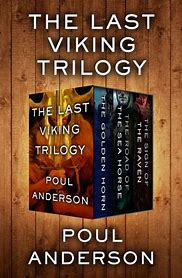The Last Viking, including the volume The Sign Of The Raven (New York, 1980), is historical fiction. This is clear throughout and particularly when a sea expedition to the North encounters neither the world serpent nor frost giants but a whale and ice bergs. In historical fiction, the hero can encounter a god or a saint or have sight of the hereafter provided that he immediately afterwards awakes from a dream.
However, I am wondering if a tiny element of fantasy has crept in. In the Pagan worldview, a bad dream is a real warning that should be taken seriously. Before sailing to claim the kingdom of England by force, Harald Hardrada dreams that St Olaf:
"...looked on him with wrath and warned him that God did not stand behind this faring." (p. 194)
A guardsman in the invasion fleet dreams that a giant troll-wife prophesies a feast for the birds on the ships, then:
"...word went from ship to ship of many men who had had such warnings." (p. 199)
It sounds as if these dreams mean something and thus that, possibly, St Olaf and the troll are real supernatural beings intervening in human affairs. But that is as far as it goes: either a very small element of fantasy or just a lot of bad dreams on the eve of a battle.

No comments:
Post a Comment